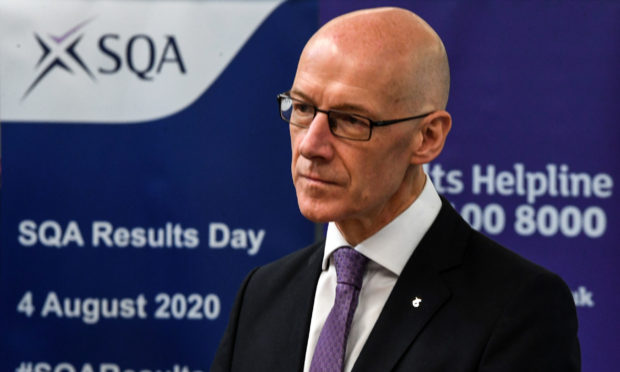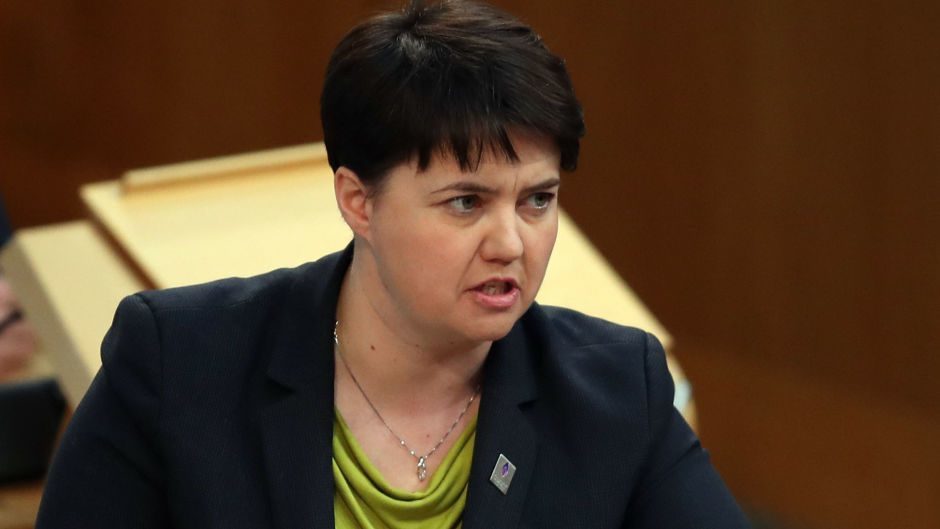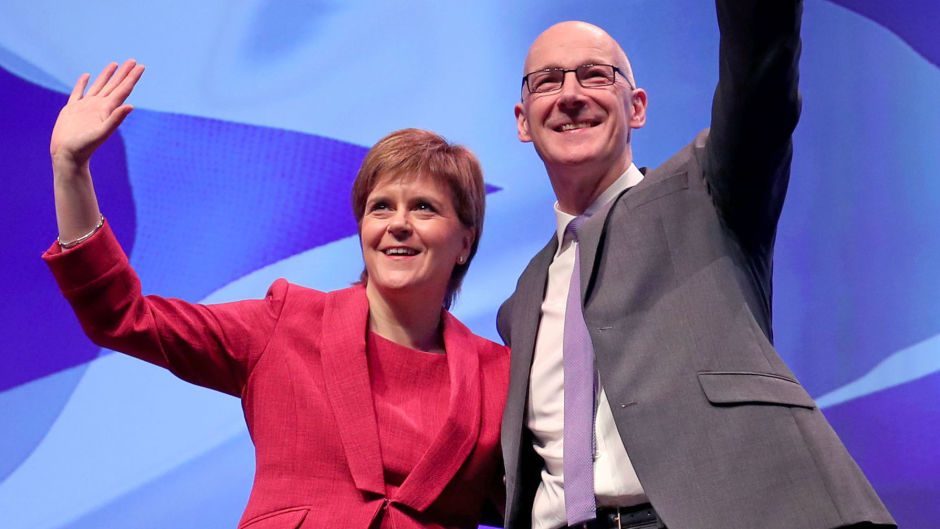John Swinney has survived a Holyrood vote of no confidence despite being roundly condemned for his handling of the exams fiasco that led to thousands of pupils having their results downgraded.
The support of his SNP colleagues plus the six Green MSPs was enough to ensure that Mr Swinney remains in post as Education Secretary following widespread anger over how youngsters were graded during the coronavirus pandemic.
The fury of children and parents and the threat of the no confidence motion tabled by Labour had forced Mr Swinney into a humiliating U-turn earlier this week when he reversed the decision to downgrade results.
The Education Secretary’s about-turn spared him the ignominy of becoming the first ever Holyrood politician to lose a no confidence vote. In the end, Labour’s motion was defeated by 67 votes to 58.
Mr Swinney, the Deputy First Minister, sat impassively on the Holyrood benches as Nicola Sturgeon paid tribute to his “honourable” character as she led the defence of her right-hand man.
His expression rarely changed as his opponents described the anxiety and stress caused to pupils by the events of the last few days and lambasted his overall record during four years in charge of schools.
Conservative Holyrood leader Ruth Davidson said his failings were “so great” and the “damage to his authority so fatal” that Mr Swinney had to go.
She accused him of ignoring repeated opposition warnings that the methodology for issuing grades when exams had been cancelled by the coronavirus was flawed.
The Scottish Qualifications Authority (SQA) had fulfilled the brief given by Mr Swinney, who had the results in his possession for five days before they were made public.
Faced with thousands of students whose dreams were dashed, he dug in and defended the system over the pupils – a system that entrenched educational inequality and meant for some there was literally nothing they could do to succeed.”
Ruth Davidson on John Swinney
Mr Swinney, Ms Davidson said, “could see the car crash that was coming but didn’t act”.
“Faced with thousands of students whose dreams were dashed, he dug in and defended the system over the pupils – a system that entrenched educational inequality and meant for some there was literally nothing they could do to succeed,” Ms Davidson said.
“Presented with clear analysis showing children from the most deprived areas were hit more than twice as hard as their more affluent counterparts, he went on the nightly television news to deny it, to saying the data does not bear that out and that’s exactly what the data did do.”
Ms Davidson claimed it was only after the opposition raised the no confidence vote that Mr Swinney changed the policy and offered an apology.
“As high a regard as people cross this chamber may hold John Swinney, the timeline of a threat of no confidence and the total U-turn that transpired, opens the education secretary to accusations he cared more about his own job than our children’s futures,” Ms Davidson added.
Lib Dem leader Willie Rennie also attacked Mr Swinney on his record in charge of education.
“When the policy direction is constantly changing in an erratic and uncontrolled fashion it has a debilitating impact on the organisation,” Mr Rennie said. “That is when the organisation just does not know what to expect next and loses confidence in the leadership.
“That has been happening to John Swinney for years now. The chopping and changing on the education bill, curriculum for excellence, testing, blended learning, the exams and the falling international standing of our education system are central to the reasons he should leave his post as Education Secretary.”
Green Education spokesman Ross Greer was critical of the original set of results, which had been based on teacher-predicted grades, which were then “moderated” by the SQA.
He gave the example of a casualty of the moderation process who had been given a D for Advanced Higher Maths despite achieving over 90% in National 5 and Higher exams and being awarded a prize for the subject by Mr Swinney himself.
But he explained that the Greens would vote against the no confidence vote because his party had been interested in negotiating a solution for the problem rather than “gunning” for the Education Secretary.
Mr Swinney agreeing to the restoration of the 124,000 downgraded results to the levels estimated by teachers and the preservation of the 9,000 that had been upgraded was key to this.
The Greens’ prime consideration, Mr Greer said, was the restoration of the “grades of 75,000 young people who had been treated so unjustly”.
But Labour leader Richard Leonard said: “As the Education Secretary clings on to his job, he should remember that tonight’s vote is not an endorsement of his record of failure. It is an indictment of a governing party which prioritises looking after its own rather than standing up for education, and a so-called opposition party – the Greens – which could be mistaken for the SNP government’s back bench.”
Ms Sturgeon described Mr Swinney as “one of the most decent and dedicated people in Scottish politics” and added: “The deputy first minister is probably the most honourable individual I have ever known in my life.”
Responding for the Scottish Government, Ms Sturgeon expressed her confidence in Mr Swinney and claimed the “opportunistic” no confidence motion was “not about principle, this is simply about politics”.
She argued that his apology and change of stance was a measure of his character and that he was prepared to admit when things had gone wrong.
“The last few days have been more difficult than they should ever have been for many young people in Scotland. I know that, and I am sorry, and so is John Swinney,” she said.
“I readily acknowledge that we focused too much on the system and not enough on individuals.
“A desire to avoid something that would look like grade inflation meant students lost out on grades that their teachers believed they deserved.
“The statistical model used meant many more students were downgraded in poorer areas than in other parts of Scotland.
“That was wrong, which is why the Deputy First Minister set out a solution on Tuesday and restored the grades of young people across the country.”



